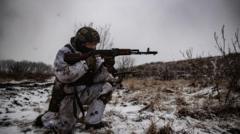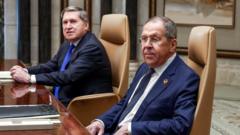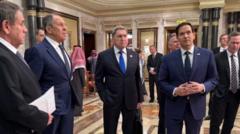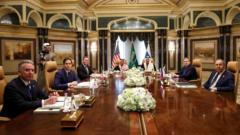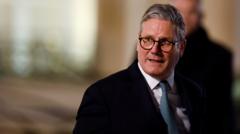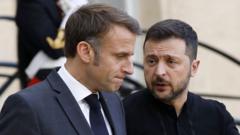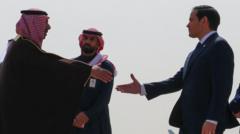European leaders emphasize the necessity of Ukraine's involvement in any peace talks with Russia, amidst fears of an American unilateral approach.
**NATO Warns Against Exclusion of Europe in Ukraine Peace Negotiations**

**NATO Warns Against Exclusion of Europe in Ukraine Peace Negotiations**
Concerns grow among European allies as Trump seeks direct talks with Russia, sidelining Ukraine’s role.
European leaders gathered in Brussels expressed solidarity for Ukraine but face rising anxiety about potential sidelining in peace negotiations. President Trump’s recent outreach to Russian President Vladimir Putin has sparked fears that Ukraine and Europe may be excluded from critical discussions aimed at ending the conflict.
During a defense ministers meeting on Thursday, NATO representatives underscored that any peace process must include Ukraine to ensure a credible resolution. European Council President Antonio Costa voiced these concerns, emphasizing that effective negotiations would require direct involvement of Ukraine and the European Union, warning that a mere ceasefire would not guarantee lasting peace or address the broader threats posed by Russia.
Following a “productive” conversation with Putin, President Trump did not acknowledge the importance of including Ukraine’s President Volodymyr Zelensky or European leaders in the discussions, which has raised alarms in Europe about how negotiations could unfold. Critics argue that a rushed approach could leave Ukraine vulnerable, undermining their position in any peace discussions, as NATO allies push back against potential U.S. unilateralism.
Echoing these sentiments, Costa took to social media to stress that, “Peace cannot be a simple cease-fire,” noting Russia’s ongoing threat to the stability of Europe. This situation highlights the delicate balance NATO faces amidst shifting U.S. foreign policy, as European nations seek to affirm their role in shaping the future of Ukraine in the context of ongoing hostilities with Russia.
During a defense ministers meeting on Thursday, NATO representatives underscored that any peace process must include Ukraine to ensure a credible resolution. European Council President Antonio Costa voiced these concerns, emphasizing that effective negotiations would require direct involvement of Ukraine and the European Union, warning that a mere ceasefire would not guarantee lasting peace or address the broader threats posed by Russia.
Following a “productive” conversation with Putin, President Trump did not acknowledge the importance of including Ukraine’s President Volodymyr Zelensky or European leaders in the discussions, which has raised alarms in Europe about how negotiations could unfold. Critics argue that a rushed approach could leave Ukraine vulnerable, undermining their position in any peace discussions, as NATO allies push back against potential U.S. unilateralism.
Echoing these sentiments, Costa took to social media to stress that, “Peace cannot be a simple cease-fire,” noting Russia’s ongoing threat to the stability of Europe. This situation highlights the delicate balance NATO faces amidst shifting U.S. foreign policy, as European nations seek to affirm their role in shaping the future of Ukraine in the context of ongoing hostilities with Russia.



